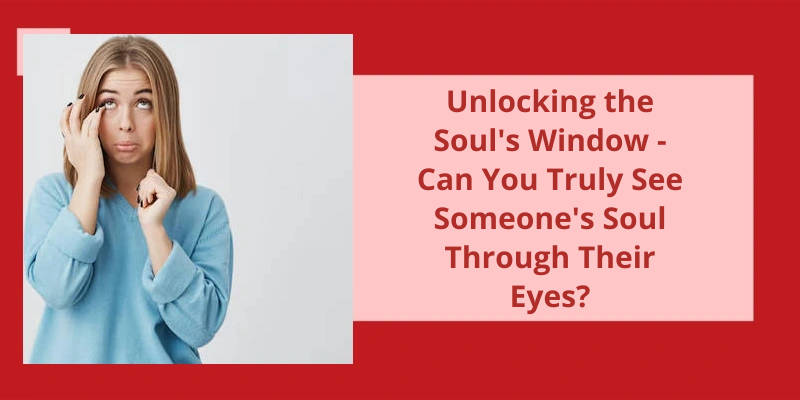"Unlocking the Soul's Window: Can You Truly See Someone's Soul Through Their Eyes?" delves into the age-old question of whether one can gaze into the depths of someone's eyes and gain a profound insight into their very essence. However, contrary to popular belief and mystical notions, it’s impossible to directly perceive the Soul through another individual's eyes. Rather, what we do have the capacity to observe are the traces of their Karma, the sum of their life's experiences in this existence and beyond. Intriguingly, recent research suggests that individuals whose pupils dilate possess an awakened pineal and pituitary gland, facilitating a more efficient communication between these vital centers in the brain. This exploration invites us to explore the intricacies of the human experience and ponder the limits of our perception in unraveling the enigma of the Soul."
What Does It Mean When You Can See Someone’s Soul?
During this intimate exchange, we engage in deep and meaningful conversation, creating a space where masks and pretenses can melt away. It’s in this vulnerable space that the eyes become a window to the soul, revealing a persons true nature and essence. When we truly see someones soul through their eyes, we gain a profound understanding of who they’re at their core.
When we engage in soul seeing, we’re able to look past societal labels and judgments that often cloud our perception. We see beyond physical appearances and social roles, recognizing that these are mere surface-level representations. Instead, we tune into a persons energy, their unique vibration, and their true self. We see their strengths, their vulnerabilities, and their authentic beauty.
Soul seeing requires a willingness to be fully present and open-hearted. It involves setting aside our own judgments, biases, and preconceived notions about a person or a situation. By doing so, we create a space of unconditional acceptance and love, allowing the other person to feel safe and seen. In return, they’re more likely to open up, revealing their deepest thoughts, dreams, and fears.
Through soul seeing, we’re able to cultivate a deep sense of empathy and understanding towards others. We recognize that each person is on their own unique journey, with their own triumphs and struggles. In seeing their soul, we honor their individuality and their humanity. We realize that we’re all interconnected, each of us carrying a spark of divinity within us.
The Benefits of Cultivating Empathy and Understanding Through Soul Seeing
Cultivating empathy and understanding through the practice of “soul seeing” can have numerous benefits. By truly looking into someone’s eyes and connecting with their essence, we deepen our ability to empathize with their experiences and emotions. This practice enables us to see beyond surface-level appearances and judgments, allowing us to develop a more profound understanding of others.
Through soul seeing, we develop the capacity to recognize the common humanity we share with others. This increased understanding can lead to improved relationships, enhanced communication, and an overall sense of interconnectedness. Additionally, soul seeing enhances our own self-awareness and introspection, enabling us to better understand our own emotions and motivations.
By engaging in soul seeing, we open ourselves up to the possibility of true connection and compassion. It’s a powerful tool for breaking down barriers and promoting understanding in a world that often fosters division and misunderstanding. Ultimately, the practice of soul seeing encourages us to approach others with empathy, kindness, and a genuine desire to understand their inner world.
This connection between the eyes and the soul has long been a subject of fascination and speculation. But now, Yale University psychologists have conducted a study that sheds light on this age-old belief. Through their research, they’ve found that the majority of individuals have an intuitive sense of their “self” being located in or around their eyes. This intriguing finding opens up a realm of questions and further exploration into the nature of our consciousness and it’s relationship with our physical senses.
Are Eyes Connected to the Soul?
The eyes have long been regarded as the windows to the soul, and this belief seems to hold a certain truth. There’s a deep and profound connection between the eyes and the soul, as the eyes are often seen as a reflection of ones innermost thoughts and emotions. It’s through the eyes that true emotions can be seen and understood, as they’re capable of conveying a range of feelings that words alone can’t express.
The eyes have a unique way of communicating a persons essence, sometimes even more effectively than words. They can convey sincerity, kindness, and love, as well as pain, fear, and sadness. It’s through the eyes that we can connect with others at a profound level, making eye contact a powerful tool for creating intimacy and establishing trust. This is why many cultures place great importance on maintaining eye contact during conversations, as it’s believed to be a way of authentically connecting with another person.
The idea that the soul is connected to the eyes isn’t only supported by psychological studies but also by centuries-old spiritual beliefs.
They’ve the power to communicate our deepest emotions and intentions, allowing others to truly see and understand us. So next time you look into someones eyes, remember that you may be peering into their soul, and treat that connection with the respect and authenticity it deserves.
The History and Cultural Significance of Eye Contact
Eye contact has a rich history and holds significant cultural importance. Throughout the ages, eye contact has been seen as a powerful means of communication, allowing individuals to convey emotions, establish trust, and create connections.
In various cultures, eye contact etiquette varies. In some societies, extended eye contact is a sign of sincerity and respect, while in others, it may be considered rude or intrusive. This cultural diversity highlights the fascinating role that eye contact plays in human interaction.
From a psychological standpoint, eye contact can provide valuable insights into a person’s emotions and intentions. It’s often believed that one can glimpse into someone’s soul through their eyes, as they can reveal inner thoughts and feelings that may not be expressed through words or actions.
However, it’s essential to remember that interpreting someone’s soul solely through their eyes is a complex matter. While eye contact can offer valuable information, it should be complemented by other forms of communication and understanding to gain genuine insight into a person’s inner self.
Overall, the history and cultural significance of eye contact demonstrate it’s powerful role in human communication and it’s potential to unlock glimpses of the soul.
Showing empathy and understanding. Listening actively and attentively. Sharing meaningful experiences. Expressing love and support. These actions can create a profound emotional bond and touch the very essence of a person’s being. While the concept of touching someone’s soul may be intangible and subjective, the connections we form can have a lasting impact on our lives.
Can Someone Touch Your Soul?
Showing empathy and understanding.
Listening and being present with someone in their moments of joy, pain, or vulnerability.
Offering support and encouragement.
Engaging in meaningful conversations and truly seeing and validating someones emotions and experiences.
Sharing in someones joys, sorrows, and passions.
When someone touches our soul, it can have a profound impact on our lives. It can bring us a sense of belonging, comfort, and validation. It can ignite a spark within us, inspiring us to be our best selves. It can create a lasting bond that transcends time and distance.
However, it’s important to note that while someone can touch our soul, they can’t control or dictate it. Our souls are unique and individual, shaped by our own experiences, beliefs, and values. It’s up to us to allow others to touch our souls and to nurture those connections.
We’ve the power to uplift, inspire, and transform others through our kindness, empathy, and understanding. So, let’s strive to connect deeply with one another, to see the beauty within each soul, and to unlock the window to true human connection.
The Spiritual Dimension of Soul Connections.
- The unbreakable bond that exists between souls
- The transcendent connection beyond physicality
- The deep understanding and empathy shared
- The feeling of unconditional love and acceptance
- The profound growth and healing experienced
- The shared purpose and journey in life
- The telepathic communication and synchronicities observed
- The spiritual lessons and transformations encountered
- The soul recognition and familiarity felt
- The eternal nature of soul connections
When someone remarks that you’ve soulless eyes, they’re typically referring to the lack of warmth and positivity that your eyes exude. Such eyes often result from enduring various hardships and difficulties, causing them to appear distant and unfriendly. Aimlessly drifting, they fail to fixate upon anything in particular, and laughter seldom brings life to them.
What Does It Mean When Someone Says You Have Soulless Eyes?
When someone says you’ve soulless eyes, they’re referring to the emptiness and lack of warmth that they perceive in your gaze. It’s a remark that denotes a certain aloofness, as if the very essence of your being is devoid of emotion and connection.
These eyes give off a distant and unfocused appearance, as if they’re looking through rather than at someone. They lack the ability to make genuine connections and establish a meaningful rapport with others. Behind the soulless eyes, one may discern a profound absence of joy and laughter. The absence of these emotions further reinforces the impression that this persons soul is disconnected or obscured.
They’re resolute in their detachment, as if guarding a secret pain or preserving a shield of self-protection. Deep within these eyes lies a story of resilience and perhaps unspoken suffering, but it’s masked by a veil of detachment that repels genuine human connection.
The Psychological and Physiological Factors That Contribute to a Person’s “Soulless” Appearance
In the quest to understand the human experience, the concept of the soul has long been explored. Can we truly see someone’s soul through their eyes? While this idea may hold a deep sense of intrigue, it’s important to acknowledge that the notion of a “soulless” appearance is more closely related to psychological and physiological factors.
Psychologically, a person’s inner emotional and mental state can influence their outward appearance. Deep-seated emotional issues, trauma, or a lack of genuine connection with others may contribute to a sense of emptiness or “soullessness” in one’s expression.
Physiologically, factors such as facial muscle tone, eye color, and genetic predispositions can also play a role in how someone’s eyes appear. However, these physical attributes alone don’t determine the existence or absence of a soul.
In conclusion, while the eyes may offer glimpses into a person’s inner world, the idea of truly seeing someone’s soul through their eyes is more complex than it seems. Exploring the psychological and physiological factors at play can lead to a deeper understanding of human nature and the intricacies of perception.
Source: What do people mean when they say you’ve soulless eyes?
Conclusion
While the eyes may reveal certain aspects of a person's inner world, such as emotions and intentions, the notion of directly perceiving someone's soul through their eyes is metaphysically implausible. Instead, we can gain insights into an individual's essence by observing the accumulations of their karma, the culmination of their life's experiences in this and previous lives.






